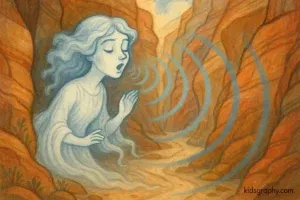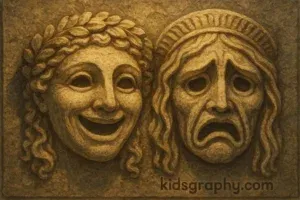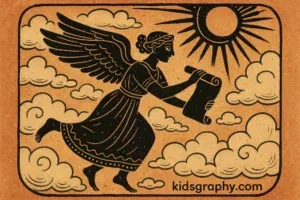In the world of Greek mythology, few stories are as magical and heartfelt as the tale of Psyche. She was not a warrior or goddess, but a mortal woman whose beauty rivaled that of Aphrodite—and whose heart led her on a journey of true love, suffering, and transformation.
Read More: Typhon in Greek Mythology: The Father of Monsters
Who Is Psyche in Greek Mythology?
Psyche was a mortal princess so beautiful that people began worshipping her instead of the goddess Aphrodite. This made Aphrodite angry, and she sent her son Eros (the god of love, also known as Cupid) to make Psyche fall in love with a monster.
But things didn’t go as planned—Eros fell in love with her instead.
Thus began one of Greek mythology’s most romantic and emotional stories.
Read More: Persephone in Greek Mythology: Queen of the Underworld
The Love Story of Psyche and Eros
Eros visited Psyche in secret, under one condition: she could never see his face. They shared many loving nights together, but Psyche grew curious. One night, she lit a lamp while he slept—and saw that her mysterious husband was not a monster, but a beautiful god.
Startled, she dropped hot oil on his shoulder. Eros awoke, heartbroken by her betrayal, and left her.
This marked the beginning of Psyche’s painful journey to win him back.
Read More: Pandora in Greek Mythology: The First Woman’s Curse
Psyche’s Trials
To prove her love and gain Eros’ forgiveness, Psyche went to Aphrodite and asked for help. The goddess gave her four impossible tasks:
- Sort a mountain of seeds in one night
- Retrieve golden wool from violent sheep
- Fill a flask from a river guarded by dragons
- Descend into the Underworld to collect a box of beauty from Persephone
With the help of nature, gods, and her own determination, Psyche completed every task—even traveling to the land of the dead and back.
Psyche’s Reward: Immortality and Love
In the end, Eros couldn’t bear to be apart from Psyche. He flew to her, healed her, and asked Zeus to make her immortal. The king of the gods agreed.
Psyche became a goddess and joined Eros on Mount Olympus. Even Aphrodite finally accepted her. Their love was now eternal.
What Does “Psyche” Mean in Greek?
The word “psyche” in Greek means both “soul” and “butterfly.” This is important in her story. Psyche’s transformation—from a doubted mortal to a radiant goddess—symbolizes the journey of the soul through hardship into beauty.
The butterfly also represents change and rebirth, just like her story of growth, pain, and true love.
Read More: Cronus in Greek Mythology: Titan of Time and Power
The Symbolism of Psyche in Greek Mythology
Psyche’s myth is more than a love story—it’s a tale of emotional growth, faith, and inner strength. Each trial she faces represents a deeper life challenge:
- The sorting of seeds shows how life often feels overwhelming and scattered.
- The golden fleece teaches courage to take what’s dangerous but valuable.
- The river task represents the flow of fear and finding a way through it.
- The Underworld journey is about facing darkness and coming back stronger.
Psyche’s story is really about the human soul’s journey. Her name literally means “soul,” and she proves that even the soul must go through struggle before finding peace and love.
Read More: Titans in Greek Mythology: Gods Before Olympus
Psyche’s Legacy in Art and Culture
Psyche’s story was first told in full by the Roman author Apuleius in The Golden Ass. Over time, it became a favorite subject for artists, poets, and philosophers.
- In Renaissance paintings, Psyche is often shown with butterfly wings, symbolizing the soul.
- In neoclassical sculptures, she’s depicted embracing Eros—highlighting love and vulnerability.
- In psychology, “psyche” became a term for the human mind or soul, inspired by her story of transformation.
Even today, we see Psyche in films, fantasy novels, and anime—always as a symbol of true love, resilience, and soul-deep change.
Read More: Hera in Greek Mythology: Queen of the Gods
Psyche and Eros: The Original Soulmates
Many people compare Psyche and Eros to Beauty and the Beast, or even Cinderella—a hidden woman, a magical lover, impossible tests, and a final reward of true love.
But unlike many love stories, Psyche’s tale shows that love is earned, not just gifted. She doesn’t wait to be saved—she fights for love, proving her worth not just to Eros, but to herself and the gods.
Their union represents the balance between love (Eros) and soul (Psyche). One cannot exist without the other.
More Stories: Psyche in Greek Mythology
FAQ: Psyche in Greek Mythology
Psyche is a mortal woman known for her beauty, who becomes a goddess after falling in love with Eros, the god of love.
Psyche marries Eros in secret, loses him due to mistrust, and completes four hard trials to win him back and earn immortality.
Aphrodite was jealous because people worshipped Psyche for her beauty instead of the goddess herself.
“Psyche” means both “soul” and “butterfly,” symbolizing personal growth and transformation.
After proving her love and completing her tasks, Zeus grants Psyche immortality so she can be with Eros forever.
Read More: Typhon in Greek Mythology: The Father of Monsters












